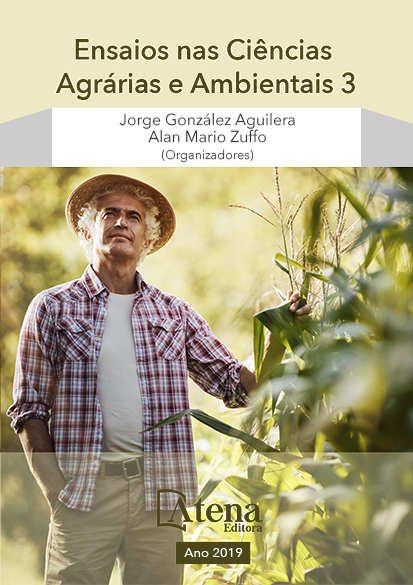
GERMINAÇÃO SOB BAIXA TEMPERATURA E QUALIDADE FISIOLÓGICA DE SEMENTES DE SOJA VISANDO A SEMEADURA ANTECIPADA
O presente trabalho teve por
objetivo verificar a qualidade fisiológica de
lotes de sementes de soja, e a possibilidade
de uso do teste de germinação sob baixa
temperatura, para simular um microclima onde
temperaturas inferiores às consideradas ideais
ocorram a campo, por ocasião da semeadura
antecipada. As análises foram conduzidas no
Laboratório de Análise de Sementes da UENP/
CLM, com duas cultivares de soja, cada uma
com 4 lotes de sementes. As sementes foram
submetidas à avaliação do teor de água, teste
de germinação, teste de germinação sob
baixa temperatura, emergência de plântulas
em areia e em substrato e teste de tetrazólio.
O delineamento experimental foi inteiramente
casualizado. Os dados submetidos à análise
de variância e as médias agrupadas pelo teste
de Scott Knott, a 5%. Os lotes de sementes
avaliados, mesmo sendo de boa qualidade
fisiológica, teriam dificuldades para formar
uma adequada população de plantas a campo,
quando semeados em épocas ou locais com
temperaturas menores ou iguais a 18 ºC. Sob
tais condições muito provavelmente poderiam
ocorrer baixos índices de germinação e
emergência de plântulas ou ainda, elevado
percentual de plântulas anormais a campo,
redução significativa na produtividade e no
retorno financeiro. O teste de germinação sob
baixa temperatura, pode ser utilizado para
predizer o comportamento de diferentes lotes
de sementes de soja, sob este tipo de estresse,
auxiliando na escolha de cultivares com maior
aptidão para se estabelecer em semeaduras
antecipadas, ou quando houver risco de quedas
bruscas noturnas de temperatura.
GERMINAÇÃO SOB BAIXA TEMPERATURA E QUALIDADE FISIOLÓGICA DE SEMENTES DE SOJA VISANDO A SEMEADURA ANTECIPADA
-
DOI: 10.22533/at.ed.39119160118
-
Palavras-chave: Glycine max; Análise de sementes; Testes de vigor; Tetrazólio; Potencial fisiológico.
-
Keywords: Glycine max; Seed analysis; Vigor tests; Tetrazolium; Physiological potential.
-
Abstract:
The objective of present work to
verify the physiological quality of soybean seed lots and the possibility of using the germination test under low temperature to simulate
a microclimate where temperatures lower than those considered ideal occur in the field
at the time of early sowing. Analyzes conducted in Laboratory of Seed Analysis of UENP
/ CLM, with two soybean cultivars, each with 4 seed lots. The seeds submitted to water
content evaluation, germination test, low temperature germination test, emergence of
seedlings in sand and substrate, and tetrazolium test. Experimental design completely
randomized. The data submitted to analysis of variance and the means grouped by
the Scott Knott test, at 5%. Evaluated seed lots, although of good physiological quality,
would have difficulties in forming an adequate population of plants in field when sown
in times or places with temperatures lower or equal to 18 ºC. Under such conditions
very low germination and seedling emergence rates could occur, or even a high
percentage of abnormal seedlings in field, a significant reduction in productivity and
financial return. The germination test under low temperature used to predict behavior
of different batches of soybean seeds under this type of stress, helping in selection of
cultivars with greater aptitude to settle in early sowing, or when risk of sudden night
falls of temperature
-
Número de páginas: 15
- Cristina Batista de Lima


